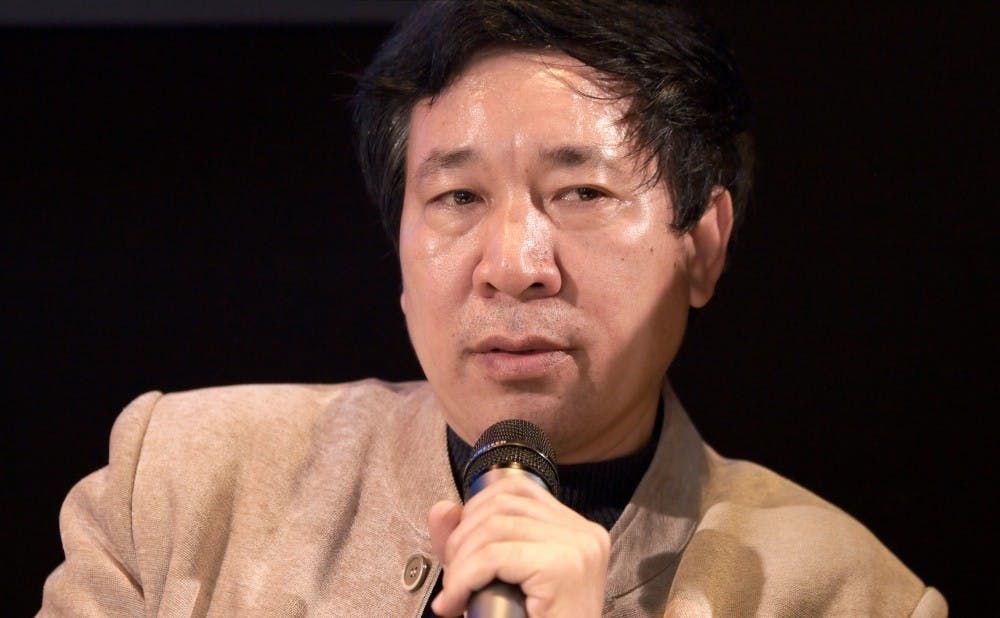For Chinese author Yan Lianke, the chance to speak openly about the censorship of his work is a rare occasion.
Yan—one of China’s most celebrated authors—gave a talk entitled “Literature and Censorship in Contemporary China” Friday at the John Hope Franklin Center. The recipient of the 2014 Franz Kafka Prize, Yan’s most famous books include “Dream of Ding Village,” “The Four Books” and “Serve the People!” With the aid of a translator, he discussed the political, social and cultural dimensions of censorship in China and recounted the personal experiences of his own works being censored.
“Politics determines everything, so our language and literature is determined by politics,” he said.
Yan noted that he has experienced many rejections in his career because editors feared that his writing would cause controversy. Although he put great emotion into his work, he said he was rejected nine out of 10 times. Eventually, he realized that if he wrote something of quality, it would be published—adding that he is now “the champion of receiving rejections.”
His success in getting his work published largely depended on outside conditions such as China’s political leadership, he said. Prior to 1989—the year of the Tiananmen Square tragedy—he thrived in the literary scene, but the instability in the following years resulted in stricter censorship, especially when he attempted to write about poverty in Chinese villages.
“Even though a writer may just be a speck, in China your literary fate is closely tied to the larger political atmosphere,” he said.
His novel “Lenin’s Kisses”—which satirizes contemporary China—caused him the most problems, he noted. However, Yan said he eventually stopped worrying about the reactions elicited by his books.
“I feel that it’s really up to me,” he said. “You can reject my work, but I will write whatever.”
Censorship in China has become stricter and more systematic in recent years, Yan explained. Because of this, publishers have begun increasing restrictions in an effort to preserve their own jobs. Individual writers have responded by engaging in self-censorship—a trend that Yan finds “terrifying.”
Yan said that he writes without this sense of internalized censorship.
“To me, the real tragedy is that once you’ve reached this stage, you might be past your golden age of productivity,” he said.
The University has also wrestled with censorship and self-censorship as it tries to establish a presence in China. Throughout its development and inaugural year, Duke Kunshan University has dealt with questions about academic freedom. In 2013, Chinese authorities banned seven topics from being discussed in classrooms, including freedom of the press and failures of Communist leaders. William Johnson, a professor of classical studies who taught at DKU last year, told The Chronicle in June that he did not believe censorship to be a major issue on DKU’s campus, but that Chinese students in his class did seem to have a tendency to self-censor.
Yan said that his advice for upcoming writers is to abandon the idea of writing to create change. Despite his success, Yan believes literature in China is marginal and that he has been even more marginal within that scene. In addition, he explained that a writer needs to focus on finding his or her own liberation from the writing process, instead of trying to make an impact on society.
Several students who attended the event said they were impressed by Yan’s words.
“He’s a really well-respected author, but the way he talks is very down-to-earth,” said Faye Lu, a first-year graduate student.
Jasmine Zhao—a second-year graduate student—said she appreciated how freely Yan could share his feelings at the event, especially because he is so restricted in his own nation.
Yan said he is continuing to write, despite having had two of his novels denied publication within the past year.
“Just a reminder, today we did not talk about censorship. We talked about Lianke’s rejections in life,” he joked.

